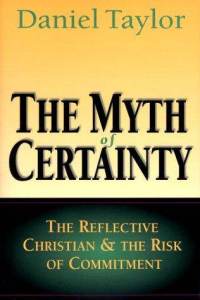The Myth of Certainty
 I recently finished Daniel Taylor’s book The Myth of Certainty. It was by far the best book I’ve read thus far in 2011 (I would have given it a 5 except that it is a bit of a tricky read at times).
It was given to me by a fellow “reflective Christian” (read: Christian doubter) and it resonates deep within how I process my faith and the world around me. Taylor addresses a question that is core to the heart of many critical thinkers who have chosen to follow Christ.
I recently finished Daniel Taylor’s book The Myth of Certainty. It was by far the best book I’ve read thus far in 2011 (I would have given it a 5 except that it is a bit of a tricky read at times).
It was given to me by a fellow “reflective Christian” (read: Christian doubter) and it resonates deep within how I process my faith and the world around me. Taylor addresses a question that is core to the heart of many critical thinkers who have chosen to follow Christ.
“How can I honestly commit myself to God and His purposes in the day to day reality of human life without denying the complexity, uncertainty, and diversity that my experiences and reflection suggest to me?”If that question resonates with you then this is a book you need to read. If this isn’t a issue to you than you probably wouldn’t enjoy it. Like much of Tim Keller’s writings, Taylor does a great job in defeating the false notion that Christianity involves more faith than secular reason. Uncertainty is a part of life regardless of which side of the fence you fall on.
“It is a myth that certainty is required for faith and commitment. And it is a myth that certainty is something the secular intellectual has through reason while the person of faith has only wishing.” “How sad to have one’s eternal relationship with God threatened by ways of thinking which may not even last a decade, much less a generation.”In the despair and perception of overwhelming challenges when it comes to understanding truth it would be easy to fall into one extreme camp or the either. We may conclude that we can figure things out with complete certainty (by intellect and reason or by God’s revelation). Or, we may throw up our hands in frustration and walk away from the struggle altogether.
“Truth is best served, in my view, by our being equally unimpressed with those who claim to have it all, neatly tied in their own package, and with those who peddle the self-fulfilling cliche that there is no truth. Most people who live in the real world understand the foolishness of both.”There are insights that he shares in this book that I often relate to but generally feel alone with. It can be a lonely place for a Christian with lingering questions. For example,
“Like rape victims who suffer the added trauma of being badgered by a defense lawyer at a trial, many wounded Christians have learned that revealing their thoughts compounds their difficulties, especially in the conservative church.” “…not only is Christendom not synonymous with a life in Christ, following Christ may well require rejecting parts of Christendom.” “I cannot lift five thousand pounds, and do not chastize myself for that. Just as I lift as much as I can when necessary, so I should reason as far and as effectively as I can, recognizing that the claims I make for what I come up with must always be guarded.”Lastly, I’ll point out that he acknowledged something that I’ve been arguing a lot lately. I’ve made the statement a few times on here that I think salvation comes down to what you do with what you know. To many, that doesn’t hold up in their view. To me, it allows me to make sense out of the diversity of explanations I see in the Bible about salvation. Here’s how Taylor addressed it:
“I am no longer bothered, as I once was, by the notion that if I were born in another place or at another time I would have been a Buddhist, or atheist, or animist. I was not born in another place or time, and I am accountable only for my response to what has been presented to me in the uniqueness of my life.”
Do You Want to Read the Bible Without Falling Behind?
Sign up your email and I’ll send you a PDF to download and use my custom-made reading plan system. There’s no way to fall behind on this system and every day will be different no matter how long you use it!
I’ll send future content directly to your inbox AND you can dive into the Bible like never before.




